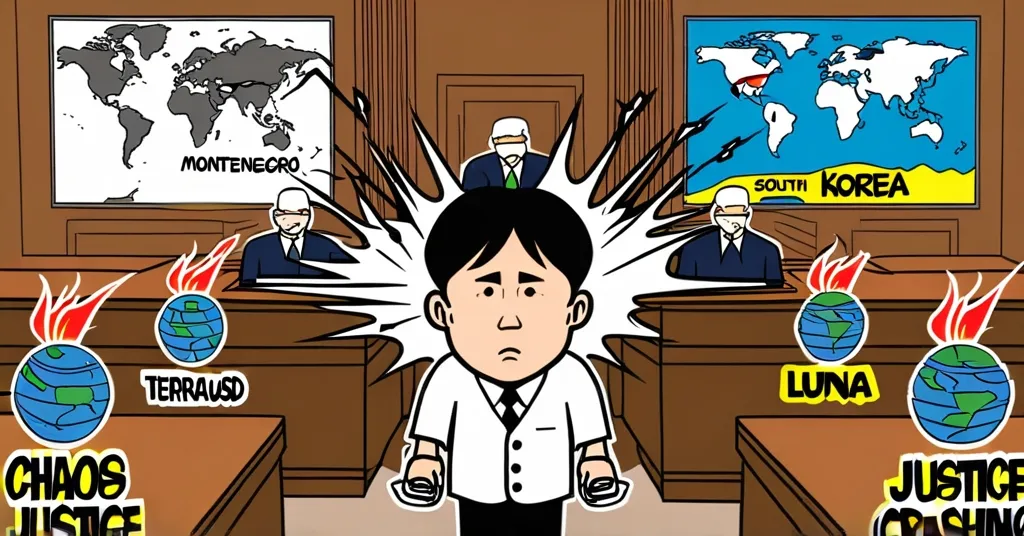Do Kwon Extradited to U.S. Amid TerraUSD Collapse Fallout, Faces Accountability

The extradition of Do Kwon, the controversial figure behind the collapsed TerraUSD and Luna cryptocurrencies, to the United States marks a significant moment in the realm of cryptocurrency accountability. Montenegro’s decision to prioritize the U.S. extradition request over South Korea’s underscores the seriousness of Kwon’s alleged financial transgressions.
- Montenegro chooses to extradite Kwon to the U.S., bypassing South Korea.
- The TerraUSD and Luna collapse resulted in a $2 trillion crypto market loss.
- Terraform Labs’ Anchor Protocol’s unsustainable returns were central to the collapse.
- Kwon evaded capture until his arrest in Montenegro using forged documents.
- Terraform Labs contends the charges are politically motivated.
Do Kwon didn’t just create TerraUSD and Luna—he constructed an empire based on hype, algorithms, and a flawed financial model. The collapse of these cryptocurrencies unleashed a financial catastrophe that demolished investor wealth, prompted regulatory crackdowns, and cast doubt on the viability of algorithmic stablecoins.
“Kwon didn’t just create TerraUSD and Luna—he created an empire built on hype, algorithms, and a dangerously flawed financial model.”
The heart of the Terra-Luna collapse centered on the Anchor Protocol, which promised a staggering 20% return on TerraUSD deposits. This model—more Ponzi-like than sustainable—enticed investors with promises that proved unsustainable. When TerraUSD lost its peg to the U.S. dollar, panic ensued, causing Luna’s price to plummet and unleashing a chain reaction throughout the crypto market.
“The fallout didn’t just take down TerraUSD and Luna—it triggered a domino effect, bankrupting other crypto firms and wiping out $2 trillion in market value.”
In the chaos that followed, Kwon went on the run, evading authorities with the cunning of a seasoned fugitive until his arrest in Montenegro, where he was caught using forged documents. While South Korea also sought his extradition, Montenegro’s Minister of Justice, Bojan Božović, signed off on the U.S. request, highlighting the global effort to hold Kwon accountable.
Key Takeaways and Questions
- Why is Do Kwon being extradited to the United States?
- What led to the collapse of TerraUSD and Luna?
- What were the global repercussions of the TerraUSD and Luna collapse?
- How did Do Kwon evade capture before being arrested?
- What is Terraform Labs’ stance on the charges against Kwon?
Montenegro prioritized the U.S. request over South Korea’s due to the gravity of Kwon’s alleged crimes.
TerraUSD’s de-pegging from $1 and the unsustainable financial model tied to Luna led to their collapse.
The collapse triggered a $2 trillion loss in the crypto market and bankrupted other crypto firms.
Kwon went on the run and was eventually arrested in Montenegro using forged documents.
The company claims the charges are politically motivated and that Luna doesn’t qualify as a security under South Korean laws.
Terraform Labs disputes the charges, branding them as politically driven. However, with $40 billion of investor money vanished, these accusations may be more than mere political rhetoric.
“They’ve called the accusations ‘unfounded,’ a word that might not carry much weight when $40 billion of investor money has evaporated.”
The saga of Do Kwon’s extradition illustrates a growing global initiative to hold crypto leaders accountable, reflecting an era where international cooperation and regulatory scrutiny are increasingly prevalent. This case is a blunt reminder of the potential pitfalls in the crypto world, highlighting the need for transparency and a robust regulatory framework to protect investors in this volatile market.



